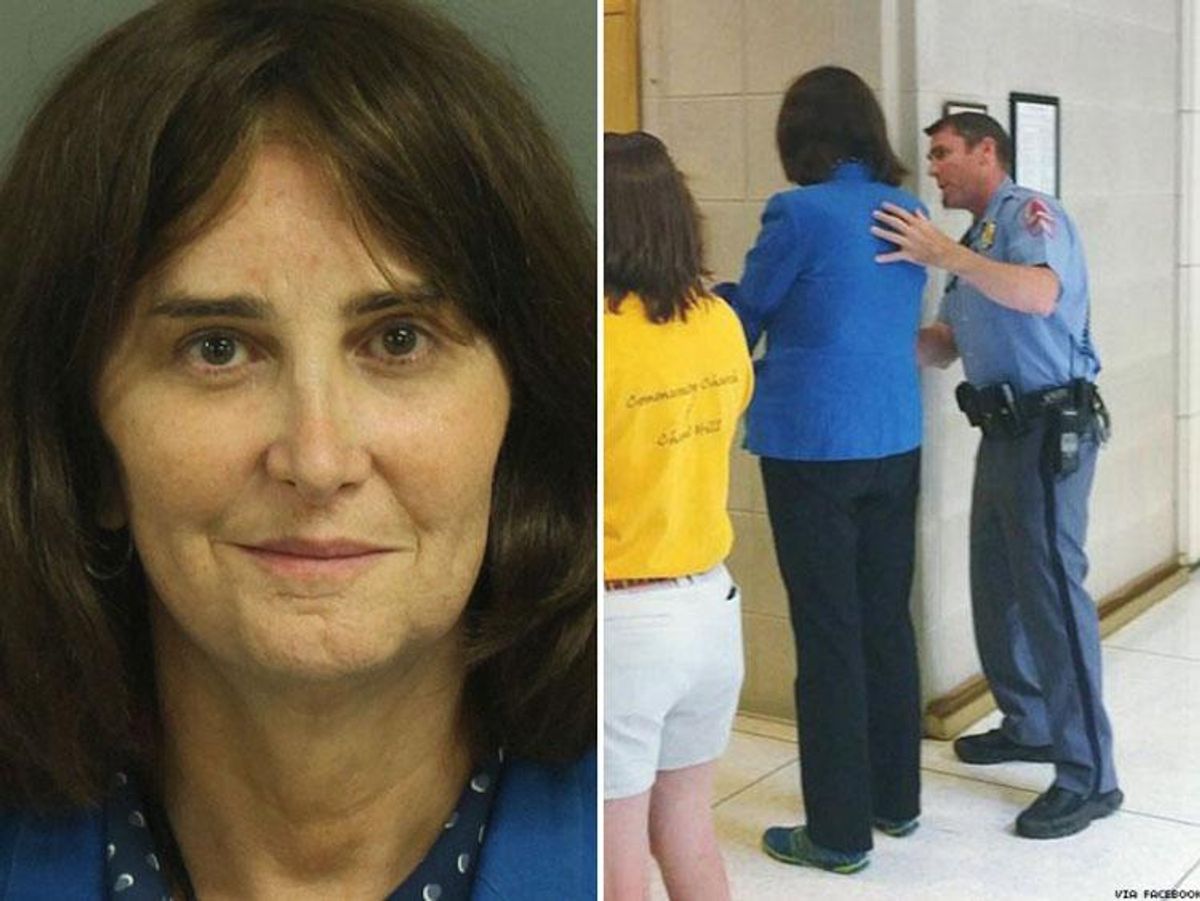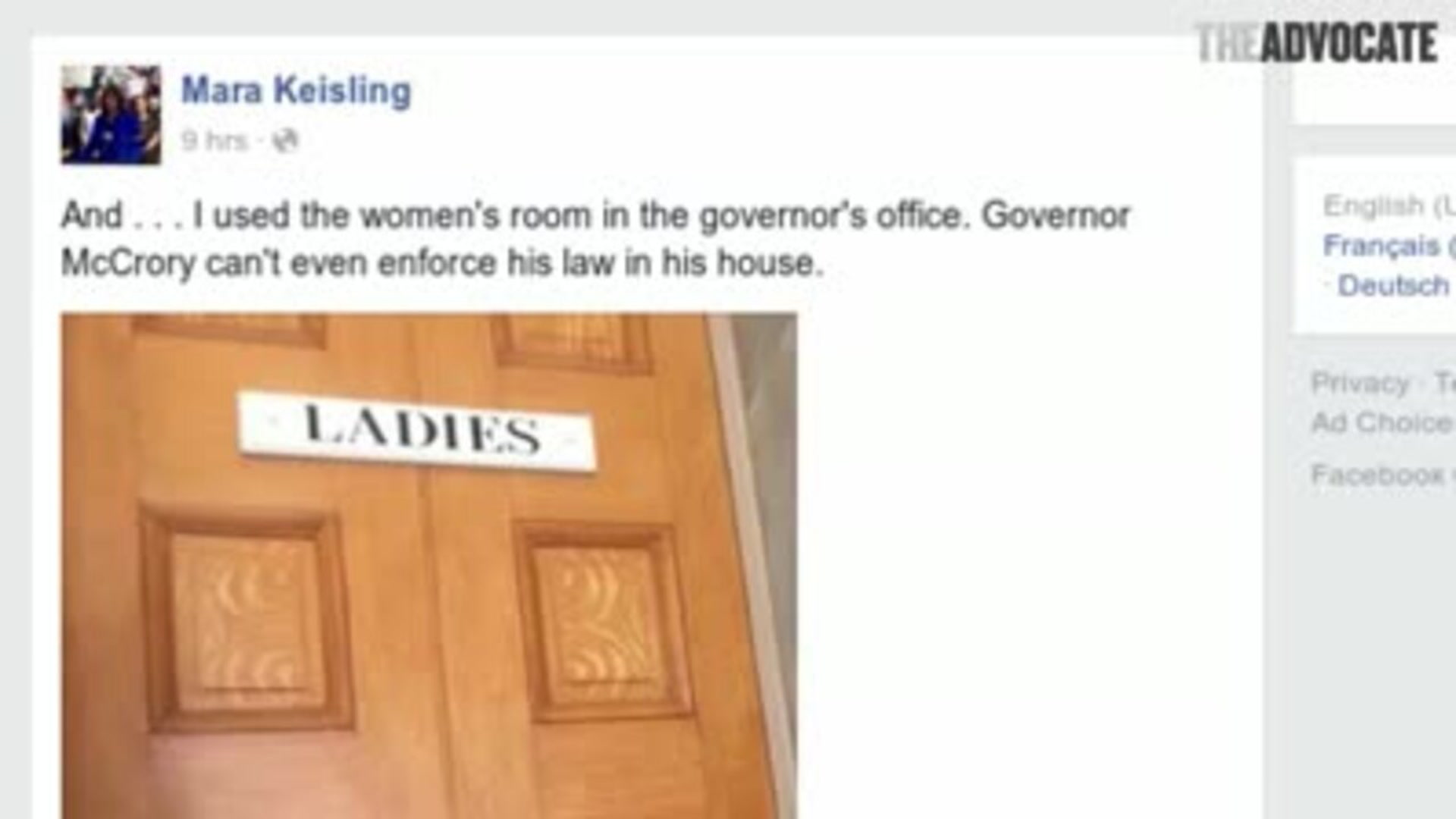Mara Keisling says she turned an evening of incarceration into a teachable moment for the law enforcement officers who arrested her in Raleigh, N.C.
The executive director of the National Center for Transgender Equality spent more than four hours in custody of the Raleigh Police Department after being arrested Monday at the state's legislative building.
Keisling, along with thousands of others, was part of a direct action organized by the North Carolina NAACP in protest of House Bill 2, which banned local governments from including sexual orientation and gender identity in antidiscrimination ordinances, and which also requires trans people to use the public bathrooms and locker rooms that don't match their identity, when those facilities are located in government buildings
Local NAACP leaders had warned lawmakers that massive sit-ins would occur if they failed to repeal the sweeping anti-LGBT law by the time they returned from a scheduled recess on Monday. Although the law was passed in a hastily called special session and signed by the governor all in a span of less than 24 hours, there was no urgency for a repeal on the part of Republicans who passed it.
Democratic lawmakers Monday introduced a bill to repeal HB 2, but it has no Republican support in the General Assembly, in which both chambers are controlled by the GOP.
At least 54 people were arrested during Monday's peaceful protest, according to the Associated Press. When Keisling refused to move from her position in front of House Speaker Tim Moore's office, the 56-year-old transgender woman was arrested. She was charged with second-degree trespassing and violation of a fire code, both Class 3 misdemeanors in North Carolina. And although she did use the women's bathroom near the governor's office, she didn't face any charges over it.
Keisling tells The Advocate that the officers she encountered were respectful and professional, and that no one mistreated her, even after she disclosed to police that she's transgender. When she arrived at the station, officers told detainees to split into two groups: men on one side, women on the other. When Keisling joined the other women of the group, she says no one questioned her.
"In fact, didn't even ask me whether a man or woman should search me," she adds. "Because I self-selected into the woman pile, they had a woman search me."
But while waiting for the rest of her group to be processed at the station, Keisling saw an opportunity to educate the officers who would likely be arresting other trans and gender-nonconforming protesters throughout the day. She asked to speak with a supervisor and was met by the district's captain and one of his subordinates.
"I introduced myself, and told them what I did, and I asked if I could talk to them about how to properly process and handle trans detainees that might be coming through," Keisling says. "And they were very receptive; they asked smart questions."
Keisling says those questions included how to respectfully process nonbinary individuals, who may not identify as either male or female, or gender-nonconforming people whose gender expression may not exist within strictly defined societal norms. Keisling advised the commanders to follow standard protocol but to seek guidance from the detainee when it comes to determining whether a male or female officer should conduct the search.
"Don't think of it as 'putting this person in box A or box B,'" Keisling recalls advising. "But say to the person, 'Who should search you? A male guard or a female guard?' And leave that up to the nonbinary person."
While Keisling disclosed her trans identity to arresting and booking officers, she cautions that such decisions ought to be made on a case-by-case basis. Disclosing, as Keisling did, is not something she would necessarily recommend for others who want to protest, or who face police in their everyday lives.
"For a lot of folks in a lot of detention situations, that would be an extremely dangerous decision," says Keisling. "I think people need to make that decision for themselves based on their circumstances. To me, it felt like, because it was a protest arrest, and because I'm white, and because I'm middle-aged, and because I'm the executive director of the National Center for Transgender Equality ... I think it made me somewhat safer to disclose."
The safety of transgender people is a key concern for Keisling and fellow trans advocates, especially with the right-wing response to so-called bathroom bills including a call to arms. "I'm taking a Glock .45 to the ladies room," wrote anti-trans activist Anita Staver on Twitter earlier this month."It identifies as my bodyguard." Staver is wife to Mat Staver of Liberty Counsel, which takes on a range of anti-LGBT cases.
Such rhetoric, especially when advanced by law enforcement officials such as Tracy Murphree, who is running to be the sheriff of Denton County, Texas, does more than just create an environment of fear, says Keisling. When presidential candidates -- like Republican hopeful Ted Cruz, a U.S. senator from Texas -- suggest that transgender people should simply avoid all public restrooms and only relieve themselves at home, it "becomes a rallying cry for irresponsible violent people," Keisling says.
"I'm extremely worried," Keisling continued, pointing to North Carolina state Sen. Buck Newton, a key supporter of HB 2, who said on the Senate floor that he would hospitalize any trans person who shares a public restroom with him. Newton is currently the Republican candidate for North Carolina attorney general. The current attorney general, Democrat Roy Cooper, is looking to oust Republican Gov. Pat McCrory in November's election.
"This is potentially the chief law enforcement officer of the state of North Carolina," Keisling says of Newton, aghast. "And he's threatening violence against people, in a bill that he helped write -- and didn't put any enforcement mechanisms into? In as nonpartisan a way as I can, I would hope that somebody running for the state's top law enforcement job wouldn't be threatening violence against people who aren't breaking the law."
These unambiguous threats of violence -- especially from people who wield guns and badges doled out by the state -- must be taken with grave seriousness, she adds. Public officials who threaten the safety of the populace should be investigated and sanctioned, Keisling argues. She declined to detail what those sanctions might look like, saying that's not for her to decide.
"But anybody in a law enforcement agency who would threaten police violence on regular people, in this day and age, with everything that's going on in the world ... is just a loose cannon," she says. "If I were in that jurisdiction, I wouldn't want them patrolling my streets."
But despite pushback from conservative lawmakers and law enforcement officials, Keisling says Monday's action left her feeling encouraged about the ongoing fight for trans equality. She applauds activists who have spent decades doing what she calls "the most important work [of] educating their families, and their classmates, and their coworkers, and the people they worship with, and their neighbors."
This know-your-neighbors approach -- which is often credited as a key accelerant of the historic pace of cultural acceptance of marriage equality -- will be what shifts the cultural perspective about transgender people and issues too, Keisling says.
"It now appears that we have to do it while we're under siege," Keisling laments. "But what I learned yesterday, when I saw all the thousands of people who were there to fight this bill, who were there to support trans people, and workers, and people who face racial discrimination -- they are forcing us to really see the coalition of good people as a necessity. And they're making us stronger."
She closed by paraphrasing the end of a poem from William Butler Yeats's The Wind Among the Reeds:
"And their children's children shall know that they lied."




















































































